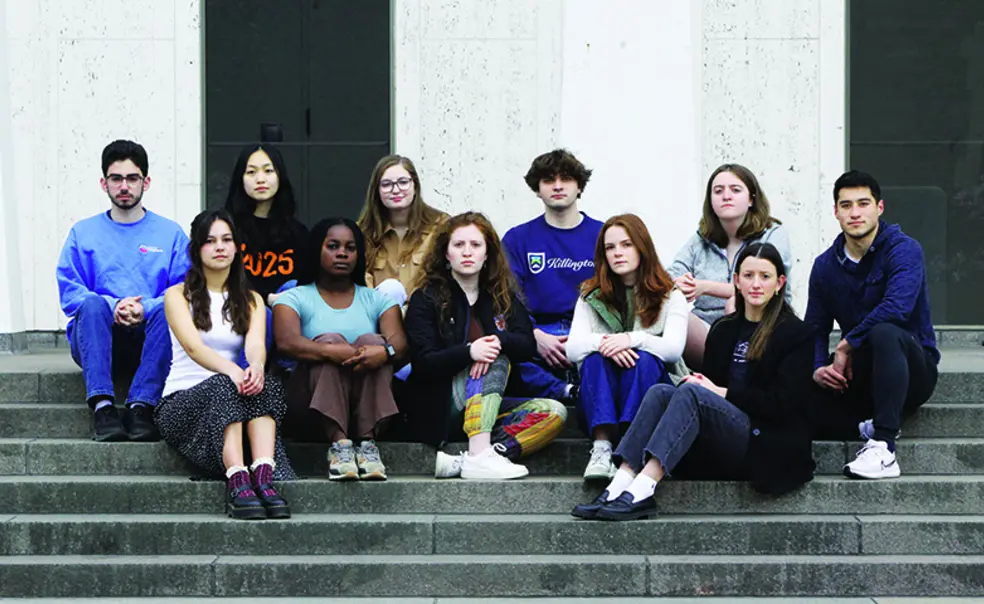Class Close-Up: Students Work to Overturn Wrongful Convictions
Kennedy Mattes ’23 receives a phone call at least once a day from a prison in Texas. On the other end of the line is Ivery Dwayne Dorsey, who is serving a 20-year prison sentence for murder. Along with Benjamin Bograd ’23 and Kerrie Liang ’25, Mattes has spent the past semester researching Dorsey’s case file, contacting him regularly, and investigating new evidence in the hope of proving his innocence and securing his freedom.
Mattes, Bograd, and Liang are three of 12 students enrolled in “Making an Exoneree,” a new seminar offered through the School of Public and International Affairs that gives undergraduates hands-on experience in overturning wrongful convictions.
It’s not a typical seminar class: Instead of readings, discussions, or papers, students work in groups of three to reexamine the case of an incarcerated individual. The first half of the semester was devoted to research and evidence-gathering; in the second half, the students have been mounting a social media campaign and producing a short documentary arguing why the incarcerated person they have been working with is innocent.
James Raymond Vreeland, a professor of politics and international affairs, was inspired to launch “Making an Exoneree” at Princeton after witnessing the success of Georgetown University’s course of the same name, which started in 2018 and has contributed to five prison releases. Vreeland’s seminar works closely with Georgetown’s Prison and Justice Initiative, which vets cases for Princeton students to tackle. The two classes run at the same time on Friday mornings, and Georgetown Law students frequently assist Vreeland’s students.
“We’re not lawyers. We weren’t trained in this beforehand. We’re entering into something that is deeply personal for both the person who’s incarcerated and their families.”
— Anna Salvatore ’25
“My experience [teaching] has been exhilarating, and I have walked out of that class every Friday so inspired by the speakers we bring in and by our own Princeton students,” Vreeland said. “I am so humbled by the amount of work that they’re putting into their cases, their command of the cases, and their passion for justice.”
During class time, students meet with a wide range of speakers, including prison reform philanthropists, lawyers, exonerated individuals, private investigators, and social media experts. Groups also have the opportunity to update each other about their progress and consult with experts about their specific cases. Most of the work, however, takes place outside of class with Vreeland as a facilitator.
Mattes’ group meets at least three times a week, if not more frequently; Mattes, Bograd, and Liang also spent four days in Houston in late March to interview Dorsey’s family members for the documentary. “This is the hardest class I’ve taken at Princeton, but also the most rewarding,” Mattes said.
Vreeland has emphasized the high stakes of the work the students are doing. “We’re always cognizant that these are real people with real lives, and we’re just trying to help,” he said.
Indeed, students have forged meaningful bonds with the incarcerated people they work with. “[Ivery is] a great person,” Mattes said. “He’s an artist. He’s a mentor to people inside. He’s also a mentor to us.”
Anna Salvatore ’25, who is working on the case of a Pennsylvania man convicted of robbery and second-degree murder, has grown immensely from her experiences in the course. “Part of the arc of the class is gaining the confidence to feel that you can do something and actually play a role in the life of somebody who’s been wrongfully convicted,” she said. “We’re not lawyers. We weren’t trained in this beforehand. We’re entering into something that is deeply personal for both the person who’s incarcerated and their families.”
Although Vreeland does not expect students to achieve exonerations after just one semester of work, he hopes that students will continue to be involved in their cases even after “Making an Exoneree” ends — and that the course will be offered for years to come. “I’m optimistic that sooner or later, we’re going to start to see people released from prison because of the efforts that our students are doing,” he said. “The first time we see a win like that for Princeton is going to be really special.”










1 Response
Svein Erik Rastad ’67
2 Years AgoA Pertinent Seminar Topic
Unhappily, “Making an Exoneree” is a very pertinent seminar topic (On the Campus, May issue). The injustices in the legal system casts a shadow on the U.S.’s role of champion of human rights.
The SPIA seminar system is the most inspiring model of academic teaching I have ever come across. It was a privilege to be part of it. Wishing you all possible success with your exonerees!